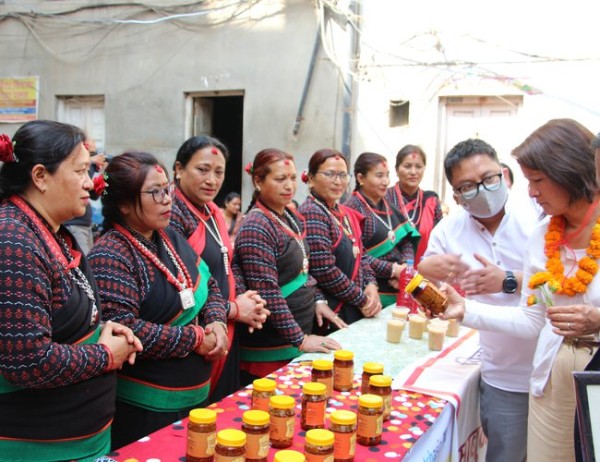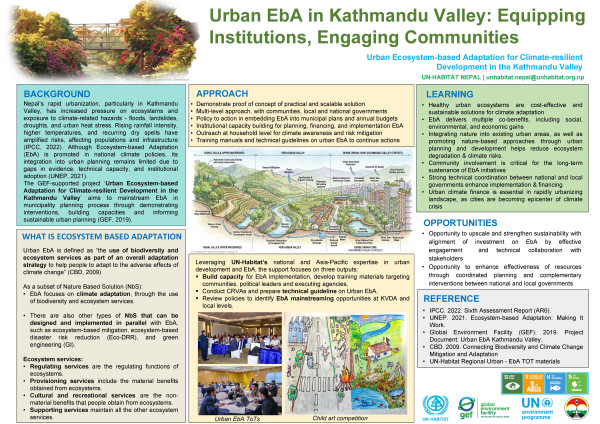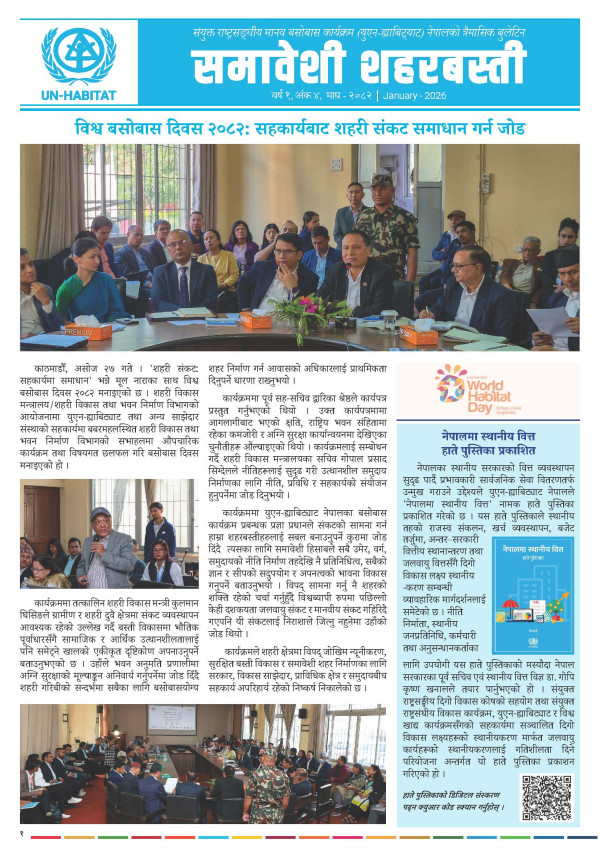PARYA SAMPADA Empowering Women

Nani Maya Maharjan, member of Nitya Ganesh Nasa Khala,
Pilachhen of Lalitpur Municipality ward 7, had never thought that traditional
Newari food like chilly pickle and Yomari could make her into an entrepreneur.
After taking entrepreneurship and skill training, the demand
of traditional Newari foods produced by the group of fifty-five year old
Maharajan is growing. At a time when COVID-19 Pandemic had increased the
intensity of difficulty, she saw hope on traditional food for sustainable
livelihood.
“We are still in early stage of production and learning from
the experiences of Bungamati. Given the current demand, what I can say for sure
is that traditional Newari food including Yomari can help us to support our
livelihood,” said Maharjan. “Making traditional Newari food like Yomari makes
women in our locality busy and generates income.”
SABAH Nepal, an implementing partner of Parya Sampada
project organizes Entrepreneur Development Training (EDT) focused on the locals
of Pilacchen providing skill training and entrepreneurship. Around 39 females
like Maharjan took 5 days long training.
“EDT mainly focused on managing the micro business, start up
and maintaining the appropriate record of investment in ratio with profit and
loss. SABAH Nepal, in support of Maya Foundation had carried out the training,”
said Deepak Basnet, Training Coordinator of SABAH-Nepal.
Maharjan stressed that this kind of training uplifts the confidence of participants on how to establish a business. She added that the members from the community are interested in establishing the business outlet and looking for technical assistance from Parya Sampada.
As women entrepreneurs are cooking the food, Nitya Ganesh
Nasa Khala has a marketing group as well. Led by Sanukazi Maharjan, the
marketing group through its social media like page and other sources tabled the
order of the meals to the women group.’
With the support of Nitya Ganesh Nasa Khala, women are the
beneficiaries of Parya Sampada Project, an initiative of SWITCH-Asia, funded by
European Union and implemented by UN-Habitat Nepal.
The project focused on a whole-of-society approach to
promote sustainable eco-tourism in the heritage settlement of Kathmandu Valley.
The project continued to carry forward relevant activities during COVID-19, to
enhance the capacities of the home-based worker to respond to the crisis.
The project had provided Advanced Stitching Training to 36
women through SABAH Nepal, an implementing agency of Parya Sampada that
provided them an opportunity to utilize their skills to contribute to the
community and sustain their livelihood.
Parya Sampada projects, in support with European Union and
Switch Asia, is promoting green economy based local business among people from
heritage sites of Bungamati, Chandragiri, Kirtipur, Bungamati, Pilachhen and
Godavari from 2018.
Maharjan, a resident of Sacho tole of Bungamati, was
dependent on her husband’s income for daily household expenses. She loved
cooking but never thought that her hobby could bring her beyond enjoyment to
support her family income. When she heard about the “Innovative Food Training”
to improve the livelihood of people in Pilachhen under the “Parya Sampada
Project” she did not waste a second to get enrolled in the Yomari Molding
Training. Yomari, a delicacy of the Newar community for specific events, is a
very popular cuisine in Kathmandu valley. It is a steamed dumpling that
consists of molded rice flour that is stuffed with molasses (Chaku). The
delicacy plays a very important role in Newar society.
This dish is normally cooked on Yomari Punhi (the full moon
day of November/December) to celebrate the rice harvesting. Yomari is also
prepared for the birthday celebrations, particularly of the children till age
12. Although Yomari making is their tradition, the market demands quality,
consistency and competence.
For this she attended five days yomari molding training that was followed by additional seven days of on-the-job training at the Village Café Khokana. The project is also connecting Pilachhen with the Village Cage – Pulchowk, an outlet of SABAH-Nepal.
She prepared around 150 yomaris on a single day and earned
Rs.1500. Encouraged with the income, she was determined to continue her skills
that makes the customer satisfied and helps to conserve the intangible heritage
of Newars.
SABAH Nepal, an implementing partner of Parya Sampada
project has coordinated the fest including the Newari food, culture, crafted
works, high quality dress, Newar Music and other corresponding outlets.
As the theme of Parya Sampada in promoting cultural heritage to foster tourism all implementing partners are focused on the same. He added that this project helps to develop a market chain through upgrading the local resources with indigenous skills aiming to promote tourism.
Source: https://www.spotlightnepal.com/2022/04/24/parya-sampada-empowering-women/





